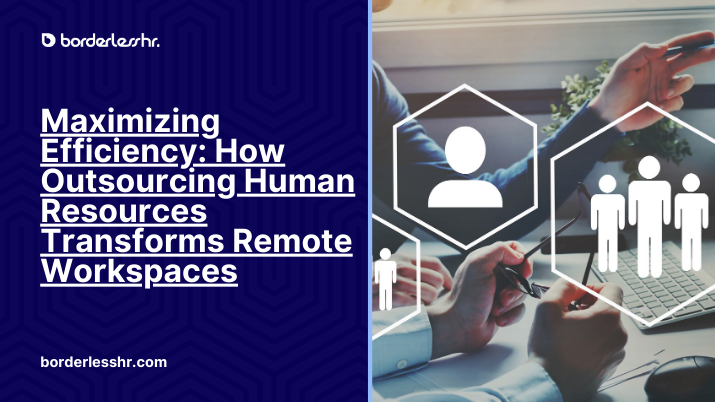The rapid evolution of technology and the global pandemic have catalyzed a significant shift towards remote work. With organizations adapting to this new paradigm, the need for streamlined operations and efficient management of remote workspaces has become more critical than ever. Outsourcing human resources (HR) functions has emerged as a strategic solution to maximize efficiency in remote work environments. This article explores the benefits, challenges, and best practices of outsourcing HR to transform remote workspaces.
The Remote Work Revolution
The rise of remote work has fundamentally reshaped the landscape of traditional office dynamics. No longer confined to a physical office space, employees now enjoy the unprecedented freedom and flexibility to carry out their tasks from virtually anywhere. This shift has brought about a remarkable transformation in the way businesses operate and has unlocked the doors to a geographically diverse talent pool. With the ability to hire skilled individuals regardless of their location, companies are reaping the benefits of a workforce that transcends boundaries and time zones.
However, the transition to remote work has not been without its challenges. Managing a workforce spread across various locations presents a unique set of obstacles that demand innovative solutions. One of the foremost challenges lies in maintaining a high level of employee engagement. The absence of face-to-face interactions and the physical presence of colleagues can sometimes lead to feelings of isolation and detachment among remote employees. Fostering a sense of belonging, commitment, and shared purpose becomes paramount in this scenario.
The advent of remote work has revolutionized the traditional office paradigm, ushering in unparalleled flexibility and a global talent pool for businesses. Yet, the challenges of maintaining engagement, communication, and performance monitoring in remote workspaces are unmistakable. Outsourcing HR functions emerges as a strategic solution, offering a bridge to overcome these challenges. By tapping into specialized knowledge and resources, organizations can create a thriving remote workforce that remains engaged, connected, and productive, regardless of geographical boundaries.
Benefits of Outsourcing HR in Remote Workspaces
1. Expertise and Specialization
Embracing the practice of outsourcing human resources introduces a transformative dimension to organizational efficiency. By opting to outsource HR functions, organizations gain access to a reservoir of specialized expertise that is uniquely tailored to the complexities of managing remote workforces. This strategic decision brings forth a team of professionals who possess an intricate understanding of the multifaceted dynamics that define remote work environments.
These HR specialists have honed their skills through extensive experience, working with a diverse array of remote teams across various industries. They are attuned to the nuanced challenges that remote employees encounter, ranging from maintaining work-life balance amidst blurred boundaries to fostering a sense of belonging in a virtual community. With this profound insight, HR outsourcing providers can curate bespoke solutions that cater to the distinct needs of each organization.
In essence, outsourcing HR functions translates into more than just delegating tasks; it signifies entrusting a team of dedicated specialists with the responsibility of navigating the intricate realm of remote work. Through their extensive experience, technological prowess, and commitment to staying abreast of industry developments, these professionals become invaluable partners in optimizing remote workspaces. By aligning their expertise with the unique challenges and goals of the organization, they empower remote teams to thrive and flourish in a landscape that transcends traditional boundaries.
2. Cost Efficiency
The decision to employ a full in-house HR team can present a considerable financial burden, particularly for small and medium-sized enterprises (SMEs) with limited resources. Establishing an internal HR department entails not only hiring skilled HR professionals but also allocating funds for office space, equipment, software, and other infrastructure essentials. Moreover, the recruitment and training of an in-house HR team demand substantial investment in terms of time and money. These costs can be prohibitive for SMEs, diverting funds away from core business activities and inhibiting growth opportunities.
One of the most substantial advantages of outsourcing HR lies in its ability to provide a scalable and cost-effective solution. Outsourced HR services can be tailored to match the organization’s specific requirements, allowing SMEs to pay only for the services they actually utilize. This flexibility means that as the business evolves, the HR services can seamlessly adjust to accommodate changes in the workforce size and composition. This adaptable approach ensures that the organization’s financial resources are optimized and directed toward activities that directly contribute to its strategic objectives.
Furthermore, the elimination of employee benefits and training costs associated with an in-house HR team translates into direct financial savings. Outsourcing partners are responsible for their personnel’s compensation, benefits, and professional development, thereby relieving the organization of these additional financial obligations. The streamlined structure of outsourcing results in a predictable and transparent pricing model, enabling organizations to better manage their budgets and allocate resources judiciously.
3. Enhanced Focus on Core Activities
By entrusting the management of HR functions to external experts, businesses are presented with a remarkable opportunity to reallocate their precious internal resources toward their core activities and strategic initiatives. This strategic shift not only liberates valuable time and human capital but also sets the stage for heightened efficiency, innovation, and growth.
With the burden of administrative tasks lifted, businesses can channel their energies into their core competencies, the very essence of what sets them apart in the marketplace. Whether it’s refining a product line, enhancing service offerings, or investing in research and development, this newfound focus enables companies to enhance their value proposition and innovate with precision. This is especially crucial in today’s dynamic business landscape, where adaptability and innovation are key drivers of success.
Ultimately, the decision to outsource HR functions represents a strategic shift in resource allocation. It’s a conscious choice to harness external expertise to manage the minutiae, freeing up internal teams to dedicate their energies to activities that directly impact the bottom line and future growth. This realignment of resources nurtures a culture of continuous improvement, where employees are empowered to explore new avenues, experiment with novel ideas, and drive the organization forward in a rapidly evolving business landscape. In this way, outsourcing HR becomes a catalyst for holistic growth, innovation, and sustainable success.
4. Scalability
Outsourced HR services offer a distinct advantage in their inherent scalability, a characteristic that plays a pivotal role in supporting organizations as they navigate the ever-evolving landscape of growth and change. As businesses chart their trajectory, there are periods of expansion marked by increased demands, and conversely, moments that require strategic downsizing to maintain agility. In both scenarios, the adaptability of outsourced HR services shines as a beacon of efficiency and resource optimization.
During phases of growth, as a company’s workforce expands, the complexity of managing human resources can become overwhelming for internal teams. The need to swiftly onboard new employees, administer benefits, and oversee compliance obligations can strain existing HR capacities. Here is where the scalability of outsourced HR services comes into play. Outsourcing partners have the capability to seamlessly integrate new employees into existing systems, ensuring that the expansion process remains smooth and uninterrupted. From facilitating the onboarding process to implementing training and development programs, outsourced HR providers adjust their scope of services to accommodate the organization’s burgeoning requirements.
The ability of outsourced HR services to scale up or down with organizational needs speaks to the essence of efficient resource allocation. Organizations no longer need to invest in building and training a dedicated in-house HR team that might be underutilized during lean periods or overwhelmed during times of growth. The dynamic nature of outsourced HR means that resources are allocated optimally, aligning with the organization’s specific circumstances at any given moment.
5. Access to Technology
HR outsourcing providers have emerged as instrumental partners in the modern business landscape, offering not just expertise but also an array of advanced technological solutions tailored specifically to the intricate demands of managing remote employees. In this era of dispersed workforces, where traditional methods of supervision and interaction are no longer feasible, these technology-driven solutions have become the cornerstone of effective remote workforce management.
One of the primary challenges in overseeing remote employees lies in tracking their time and ensuring optimal productivity. HR outsourcing providers rise to this challenge by furnishing businesses with cutting-edge time tracking solutions. These tools transcend the limitations of traditional punch-in systems, offering intuitive digital platforms that allow employees to seamlessly log their work hours, record breaks, and manage their schedules. These sophisticated platforms not only foster transparency and accountability but also provide managers with real-time insights into remote employees’ work patterns, enabling them to address any deviations promptly.
Collaboration tools are yet another technological facet that HR outsourcing providers bring to the table. The digital workspace of remote employees demands seamless avenues for communication, file sharing, and collaborative project management. Recognizing this, outsourcing partners offer a suite of collaboration tools that facilitate virtual meetings, instant messaging, document sharing, and task tracking. These tools bridge the geographical gap between team members, enabling them to work together as if they were in the same physical location.
Challenges and Mitigation Strategies
While the benefits of remote work are undeniable, the shift to this mode of operation has brought to the forefront a range of unique obstacles that demand innovative solutions. In this section, we delve into the multifaceted challenges that arise when managing remote employees and explore strategic mitigation strategies that empower businesses to overcome these hurdles effectively.
- Data Security and Confidentiality: Managing sensitive employee data in remote settings introduces a complex realm of challenges, with data security emerging as a paramount concern. In this digital age, where cyber threats are a constant presence, organizations must adopt a vigilant stance to protect their employees’ data. To navigate these treacherous waters, businesses must proactively engage in the rigorous vetting of their chosen outsourcing partners. Scrutinizing their track record, assessing their data security protocols, and evaluating their compliance with industry standards are essential steps in ensuring the partner’s reliability.
- Communication and Culture: Maintaining a cohesive company culture and fostering open communication channels become notably intricate endeavors within the context of a distributed workforce. The physical separation of employees across various locations can give rise to a sense of detachment and hinder the natural camaraderie that often flourishes within a traditional office setting. Nurturing a collective identity and shared values necessitates deliberate efforts that transcend geographical boundaries. This is where the strategic involvement of outsourcing partners holds significant value.
- Employee Engagement: In the realm of remote work, a significant challenge that organizations grapple with is the potential for remote employees to experience a sense of detachment from the company’s overarching mission and vision. The physical separation from the central office environment can sometimes lead to feelings of isolation, making it imperative for businesses to bridge this gap in meaningful ways.
Best Practices for Outsourcing HR in Remote Workspaces
1. Clear Expectations
Central to the successful collaboration between organizations and their outsourcing partners in the realm of remote work is the establishment of clear and well-defined expectations. This encompasses delineating roles, responsibilities, and communication channels with meticulous precision. By outlining the specific responsibilities that the outsourcing partner will assume and the tasks that remain within the organization’s purview, potential ambiguities are dispelled, ensuring a smooth and harmonious workflow. Equally vital is the delineation of communication channels, as a seamless exchange of information is the bedrock of effective collaboration. With clearly defined lines of communication, queries, concerns, and updates can be swiftly addressed, facilitating a transparent and efficient partnership that optimizes the benefits of HR outsourcing in the context of remote workspaces.
2. Regular Performance Reviews
An essential facet of optimizing remote workspaces involves the establishment of a robust performance evaluation framework that ensures accountability and facilitates ongoing enhancement. This applies not only to remote employees but also extends to the outsourcing partner engaged in managing HR functions. Regular performance reviews serve as the cornerstone of this framework, providing a structured platform for constructive feedback and goal alignment. For remote employees, these reviews offer a consistent opportunity to assess their achievements, set objectives, and discuss any challenges they might be facing. Simultaneously, performance evaluations of the outsourcing partner foster transparency, allowing organizations to gauge the efficacy of the outsourced HR functions and identify areas for improvement. By harmonizing performance evaluations across the spectrum, businesses create a culture of accountability and continuous growth that resonates throughout the entire remote workforce ecosystem.
3. Technology Integration
Selecting the right outsourcing partner holds paramount importance in the realm of remote workspaces. When considering an outsourcing provider for HR functions, organizations must prioritize compatibility with their existing technology ecosystem. Seamless integration between the outsourcing partner’s technology solutions and the organization’s systems ensures a harmonious transition and operation. This compatibility translates into streamlined processes, reduced learning curves, and enhanced efficiency. By choosing a partner whose technology aligns with the organization’s infrastructure, businesses can maximize the benefits of outsourcing, minimizing disruptions and maximizing the potential for a successful remote workforce management strategy.
4. Flexibility and Adaptability
Central to the success of outsourcing HR functions in remote workspaces is the need for flexibility and adaptability in the outsourcing arrangement. In a dynamic business landscape, characterized by shifting priorities, evolving market conditions, and unforeseen disruptions, the outsourcing partnership must be designed to seamlessly accommodate changing circumstances. Outsourcing providers play a crucial role in ensuring that the arrangement remains agile, capable of swiftly responding to emergent challenges and opportunities. By building in mechanisms to adjust the scope, scale, and focus of outsourced HR services, organizations can not only optimize resource allocation but also navigate unforeseen circumstances with resilience. This adaptability empowers businesses to harness the full potential of the outsourcing partnership, regardless of the twists and turns that the remote work landscape may take.
5. Legal Compliance
Safeguarding legal compliance in the realm of remote work is of paramount importance, and organizations seeking to outsource HR functions must ensure that their chosen partner possesses comprehensive expertise in this crucial area. The complexities of remote work encompass a spectrum of legal and regulatory considerations that demand meticulous attention. From tax implications and labor laws to data privacy and employment contracts, a thorough understanding of these intricate frameworks is essential to mitigate potential legal risks. An adept outsourcing partner adeptly navigates these legal intricacies, guiding organizations to create policies and practices that align with the ever-evolving legal landscape. By placing a knowledgeable outsourcing partner at the helm, companies not only shield themselves from potential legal pitfalls but also ensure that their remote work initiatives are ethically sound, compliant, and in line with prevailing regulations.
Conclusion
In an era defined by rapid business evolution and the rise of remote work as the new standard, the optimization of remote workspaces stands as a critical pursuit for organizations aiming to thrive. Within this dynamic landscape, outsourcing HR functions emerges as a dynamic and impactful strategy to tackle the unique challenges presented by remote work environments. By leveraging the expertise of specialized professionals, businesses can effectively streamline operations, cut down on costs, and cultivate a remote workforce that is both productive and deeply engaged. The success of this transformative approach, however, hinges on the careful selection of outsourcing partners, the implementation of effective communication strategies, and the fortification of data security measures.
For organizations seeking a seamless transition to an outsourced HR solution that thrives in the realm of remote work, BorderlessHR stands as a beacon of excellence. With a proven track record in navigating the intricacies of remote workspaces, BorderlessHR offers tailored strategies that align with your company’s goals and values. Their team of experts is well-versed in remote work dynamics, equipped to drive engagement, bolster communication, and optimize performance evaluation processes. By partnering with BorderlessHR, your organization gains a strategic advantage in this evolving landscape, ensuring that remote work is not just a necessity, but a catalyst for unparalleled efficiency and growth. Elevate your remote workspace to new heights with BorderlessHR – your trusted ally in harnessing the true potential of remote work.







